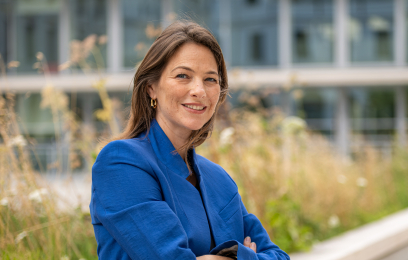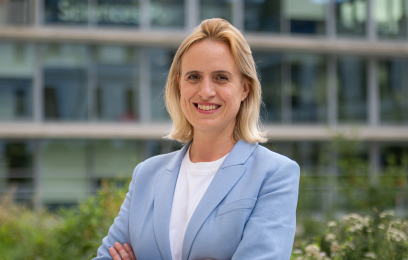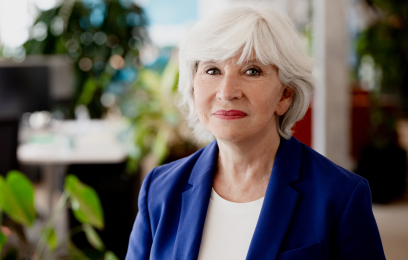Paris – June 21, 2021 - The continuous and accelerated spread of technological innovations calls for an increase in academic research, particularly in the human and social sciences, in order to better understand, anticipate and act upon their impact on contemporary societies.
To foster the commitment of its scientific community to studying, deciphering and clarifying of the major issues at stake for the common good around new technologies, including the Internet and social networks, Sciences Po announces the signing of a partnership agreement with the McCourt Institute Foundation.
Scientific excellence at Sciences Po as part of a global project
Through this partnership, Sciences Po becomes a founding partner of the new American research institute created by entrepreneur Frank McCourt and dedicated to the theme of "Tech for the Common Good".
“Making technology work for society is one of the biggest challenges humanity faces. It's time to reset technology: how it is designed, developed and leveraged. It should not be a vehicle to benefit a select few, but an engine for the common good. I'm launching the McCourt Institute with this mission at the center. I am proud to have Sciences Po as a founding partner as they bring a track record of demonstrable results in advancing society. Their excellence in the social sciences is exactly the perspective that must be elevated now...it is urgently needed”, said Frank McCourt.
Sciences Po and its historical partner Georgetown University will mobilize their professors, PhDs, researchers and scholars to conduct interdisciplinary research on the use and development of new technologies for the common good.
“Issues surrounding technologies, the use of data and social media are central to research in human and social sciences. They cut through all disciplines at Sciences Po: from economics to history, from sociology to Law and political science. The McCourt Institute serves society and the common good: it will considerably enhance the scientific production of our researchers” stated Laurence Bertrand-Dorléac, Chair of the Board of Directors of the FNSP.
$25 million over 10 years for social science research on technologies for the common good
As part of this partnership, Sciences Po will receive a grant of $25 million over 10 years to support the development of new scientific work conducted by its community of researchers. The grant will fund annual or multi-year research projects on topics related to "Tech for the common good," particularly on public policy and ethical and legal issues.
This grant is part of Frank McCourt's plan to provide the global research community with the means to explore the topic of technologies for the common good, to shed light on the scope of the disruptions they are causing, and to contribute to vigilance in matters of ethics and social, societal and environmental responsibility.
The grant, validated by the Sciences Po Donations Committee, will be the subject of an agreement signed between the FNSP, the McCourt Institute Foundation and the Sciences Po American Foundation, which guarantees the total independence of the researchers' research work with respect to the various projects carried out by the donor, in particular in the choice of research protocols and publication of results.
A partnership with Georgetown University
The academic partnership with Georgetown University will begin on June 22, with a working seminar in Paris between the two universities on the rue Saint Guillaume campus.
The research projects conducted and financed within the framework of the McCourt Institute will be selected by a steering committee based at Sciences Po, which will meet twice a year.
Composed of members of Sciences Po ‘s leadership, of the Sciences Po American Foundation, of the McCourt Institute Foundation, of the Georgetown University and of scientific experts, this committee will submit high-impact academic projects from all areas of research at Sciences Po.
About Sciences Po
Sciences Po is a selective research university of international standing based on the values of openness and excellence. Sciences Po's unique academic model combines expertise in human and social sciences, multidisciplinarity and a professional grounding to educate professionals and citizens able to understand and transform society. Diversity is a key element of Sciences Po's identity. The student body comprises 47 percent international students from 150 different countries and 26 percent scholarship students (up from 6 percent in 2000).
Press contact:
Marie Frocrain: marie.frocrain@sciencespo.fr / 01 49 54 37 71

28.07.2025
JULIE KLEIN EST NOMMÉE DOYENNE DE L'ÉCOLE DE DROIT DE SCIENCES PO
Paris, le 18 juillet 2025 – Luis Vassy, directeur de Sciences Po, a nommé Julie Klein doyenne de l'École de droit. Elle succède à Sébastien Pimont.
Professeure des Universités à Sciences Po depuis 2020, Julie Klein dirige la spécialité « Entreprises, Marchés, Régulations » (EMR) du Master Droit économique. Juriste reconnue, elle est spécialiste du droit des obligations, du droit de la preuve et du droit économique. Elle siège au Conseil scientifique de Sciences Po, préside la section disciplinaire compétente à l'égard des étudiants, et assure la direction scientifique de la Semaine juridique – édition entreprise (JCP E).
Ses travaux interrogent les articulations entre droit civil et droit commercial. Elle contribue activement aux réflexions collectives sur l'évolution du droit, au sein de plusieurs groupes de travail pilotés par la Chancellerie ou le Haut Comité juridique de la place financière de Paris (HCJP), notamment sur la réforme du régime des obligations, le droit des sociétés ou les chambres internationales.
Luis Vassy, directeur de Sciences Po : « Julie Klein est une juriste et chercheuse d'exception investie depuis plusieurs années au sein de l'école de droit et au service de l'institution. À l'heure où les grands bouleversements du monde redessinent les contours du droit, elle portera avec ambition le projet de l'École. Je sais pouvoir compter sur sa vision, son engagement et son exigence intellectuelle pour continuer à porter l'école de droit de sciences po au plus haut niveau.
Je remercie Sébastien Pimont d'avoir assuré la croissance et le développement de l'école depuis cinq ans. Son mandat a été marqué par d'indéniables succès en France avec la réussite massive de nos étudiants dans toutes les professions juridiques, comme à l'étranger, ce dont témoigne l'attractivité croissante de l'école à l'international. »
Julie Klein, doyenne de l'École de droit de Sciences Po : « Je suis très honorée de ma nomination comme doyenne de l'Ecole de droit et remercie Luis Vassy pour sa confiance. L'École de droit de Sciences Po a su affirmer, grâce à mes prédécesseurs, une identité forte et innovante. Je souhaite développer cette dynamique, en consolidant son excellence scientifique, en renforçant les liens avec la pratique du droit, et en accompagnant les étudiants dans leur capacité à penser et exercer le droit dans un monde en transformation. »
Lire plus

